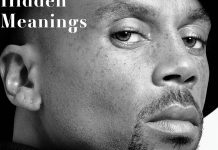
Photograph by Caroline C. Kilgore
When Brian Panowich was a boy, he would pore over his father’s comic books and pulp fiction paperbacks—and then retreat to his room and rewrite them. “I was convinced I could make them better,” he says. Now 43, Panowich has published a brilliant debut novel that backs up all that youthful hubris.
Bull Mountain (Putnam) is the multigenerational saga of a crime family in North Georgia. In the 1940s, they ran moonshine; now they cook meth. Sheriff Clayton Burroughs is the white sheep of the family, determined to break the cycle of violence and retribution. When a federal agent asks for Clayton’s help in bringing down the criminal empire, the family’s history and the agent’s hidden agenda begin to unravel. The narrative is told through multiple viewpoints, moving backward and forward in time as the body count escalates.
The author of this extraordinary story was a self-described “military brat” and then a touring musician for 12 years before settling in Augusta.
He lives with his wife, their four children, and two Jack Russell terriers and works as a full-time firefighter. In contrast to his nomadic childhood, Panowich’s wife, who grew up in North Georgia, is bound by family roots that date back for generations, and Panowich is enthralled by that stability.
“Imagine being content with what you have,” he says. “That feeling of having to accomplish more to be more is almost everywhere you go. I experience that the least in those mountains.”
You were a musician and then a firefighter before publishing your first book. How did that transition come about?
Coming off the road and leaving that crazy life behind was one of the hardest and experiences of my life. I went all in. There wasn’t any backup plan. With music, or any art for that matter, you have to remove all the safety nets if you really want to rise above the glut. Only sometimes, even 100 percent isn’t enough. Admitting that to myself was brutal.
The trouble was, after spending years and years being the center of attention, even in the seediest corners of the universe, jumping into a desk job was not going to cut it. But I had a brand-new daughter to provide for, and no skills. I picked up a local entertainment paper one day after I moved back home, and saw that a friend of mine who fronted a fantastic local band was also now in the fire service, and something just clicked. It was like a lifeline for me. At first, I wasn’t sure if I was cut out for it, but I found out I was, and I love it.
When did you first realize you wanted to write?
I knew I could be a writer when I was a kid. When I was in grade school, I’d read my dad’s comics and old pulp magazines, and then go to my room and rewrite the plots. I was convinced I could make them better. But there was also always a significant amount of self-doubt. Even after signing with a literary agent, or selling my novel to a prestigious house like Putnam, I still kept thinking, “How is this all possible?” Honestly, it wasn’t until a few months ago, when I received an email from [author] Tom Franklin—whom I admire greatly—telling me how much he enjoyed Bull Mountain, that I began to believe that I might be pretty good at this.
What’s the first book you remember really loving?
As a kid I’d have to say The Stand by Stephen King. It eclipsed anything else I’d read up to that point. It was the first book I asked my parents to buy me in hardcover, because the paperback didn’t look cool enough on my bookshelf. As an adult, Daniel Woodrell’s Give Us a Kiss. It still demands my attention from time to time.
Tell us a little about how Bull Mountain took shape. Did it start with a plot line, a character, a scene, or something else?
I was out in the woods one afternoon riding my mountain bike and listening to music, when Up on Cripple Creek by The Band came on. The first line of that song is, “When I get off of this mountain . . . ” I dwelled on that line for about two miles, and then immediately stopped, dropped my bike in the grass and wrote out the backstory for the character that would eventually become my lead protagonist, Clayton Burroughs. By the time I got my bike loaded up in the truck and was headed home, I’d plotted out the gist of what would become Bull Mountain.
I’d heard that song a thousand times before, and ridden that trail at least a dozen times already, so I’m not exactly sure what kicked off my imagination on that particular day. Whatever the case may be, ever since, I never ride without a notebook and pen in my pack.
In many ways, Bull Mountain is like The Godfather set in North Georgia. Was that a conscious goal?
Not at first, no, but being such a huge fan of Mario Puzo’s book and the movies, I think subconsciously I may have been working that in. Something I did do intentionally was to try and show how important and accomplished these Southern families were, without piling more myth on the stereotype. I even pushed the drugs and the commerce of drugs into the background because I didn’t want that to be the focus. The people and the family needed to be the focus. The push and pull of loyalty to kin versus good old-fashioned right or wrong was what I set out to explore, and hopefully that’s what I did. I mean, does anyone even know what Vito Corleone did for a living? That wasn’t the point. The point was the struggle to maintain the family, and in Southern culture, there is no higher priority than family.
What is it about the people of North Georgia that intrigues you?
Imagine being content with what you have. That feeling of having to accomplish more to be more is almost everywhere you go. I experience that the least in those mountains, among those people. I’m not saying it isn’t that way in Carolina, or Wyoming, or Montana, or anywhere else. But for me, that serenity is North Georgia. And the people who live there inspire me to be content as well.
Could this family’s story have happened anywhere else?
I think aspects of the story could happen anywhere—wherever there is money and power at play. But a lot of this story is uniquely Southern, and uniquely Georgian.
The author on…
Endings
I knew how the book would end before I wrote the first word. I wasn’t sure how I was going to get there, but I knew the destination.
Life vs. art
My wife constantly has to remind me that my characters are not real, and that I need to come fix dinner for the kids because they are.
A version of this article originally appeared in our July 2015 issue.










![The North Carolina Museum of Natural Sciences’ newest exhibit is a [pre]historic first](https://cdn2.atlantamagazine.com/wp-content/uploads/sites/4/2024/04/DD-3-100x70.jpg)


